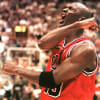In 1998, Fortune estimated Michael Jordan's contribution to the economy to be worth something like $10 billion, between sales of tickets, merchandise, and Nike apparel. Now, 17 years later, the man himself is a billionaire, and the Jordan brand continues to dominate. As a result, there's an entire tertiary market comprised of deadstock and secondhand sneakers and gear. Since opening last fall, Jordan Heads Brooklyn, an all-Jordan boutique and consignment store in Bed-Stuy, has functioned as part museum, part retail space—a sort of physical manifestation of the global culture of intense Jordan devotees that owner Calvan Fowler is documenting for a film due out later this year. We spoke to Fowler about Jordan Heads' ethos and about the intensity of the fandom he witnesses every day.
How did you decide to open Jordan Heads BK? The store is the byproduct of a film that I've been working on. It will be out later this year, and it's called Jordan Heads. Essentially, I wanted to create a space for people who have a love of and an interest in Michael Jordan. There's nothing like that anywhere else. Not even Jordan Brand had a space like that, not until recently. It's an intimate personal experience—that's what it's all about.
What's a regular day in the store like? It's people coming in and, first of all, they get a little emotional because it reminds them of their childhood and youth. For me, it's pretty much overwhelming because the goal was to create that kind of store, to get that emotion. People come in with personal stories and the fondest memories that takes them back to when they were young.
On a regular day, too, I see the reaction of how people feel in the neighborhood. [Bed-Stuy] is changing. It's almost like Do The Right Thing meets The Breakfast Club now. So sometimes they're like, "Why here? Why not downtown?" And my response is, "Why not here? I mean, Michael Jordan was born in Brooklyn, but you'd be amazed how many people know the product but not the history. In some ways we're getting to educate some people.
What are some of the best Jordan head stories you've heard or collected for the film? I've shot since 2004, so there's so much rich history and so many vivid memories of Jordan. Yesterday, a young lady basically told me that she got her boyfriend into wearing Js. You normally hear it the other way around, but he got hooked after she bought him a few pairs and now he's a Jordan head. Essentially, this is a film about the consumer. If Nike were to do this film, it would end up being one big advertisement, but in this, people express themselves freely. I heard someone tell me about the first time they went to jail and which Js they had on that day. Someone was telling me about living on cereal and ramen noodles to be able to buy Jordans.
How do you feel about the whole culture of lining up for sneakers? Now it's not as bad because, back then, retros weren't released as often. Now a pair of kicks drops every weekend, but supply and demand was so different back then. But the thing is people [line up] for all other sorts of things, but Jordan heads and sneakerheads get a bad rap for it because it started in the ghetto. If you stand in line for Bruce Springsteen tickets or Paul McCartney, it's considered okay.
I watched some clips from the film, and I noticed that there's so much diversity in the people you talk to. Not just racially, but age, nationality, everything. It's amazing how these sneakers bring people together, that's how I see it. It's like music, like rap or rock or any kind of music. I grew up in Far Rockaway, Queens, so I never guessed it. You'd never guess that something like that would transform to being big everywhere in the world. You've got parents who take their kids to events and then they get into what their kids are doing. It really brings their families together. We went to Japan, England, France, worldwide. We went all over and it's the same story, but it's a personal thing for each individual. Different races, cultures, socioeconomic classes.
What is it about Jordan that bred this kind of intense passion in so many people? It's the man himself, what he did on the court. The accolades, work ethic, and ambition, to be the best at what he did. If it wasn't for that, these sneakers wouldn't be worth anything. It's rubber and plastic and leather, but it's more than that. It's a legacy. It's a tangible thing people can hold and cherish.
How did one of the worst-dressed men in history become such a huge cultural force, like, stylistically? Man. When Nike dresses him, he looks crazy good. But then you see him courtside and you're like, "What kind of jeans are those?" But then you know they cost a million dollars. I guess that's just his style. He's a country boy. He was born in Brooklyn, but he went down to North Carolina and got that kind of country gear. A stylist wouldn't hurt, though.
Lead image credit: Getty Images / Stringer

